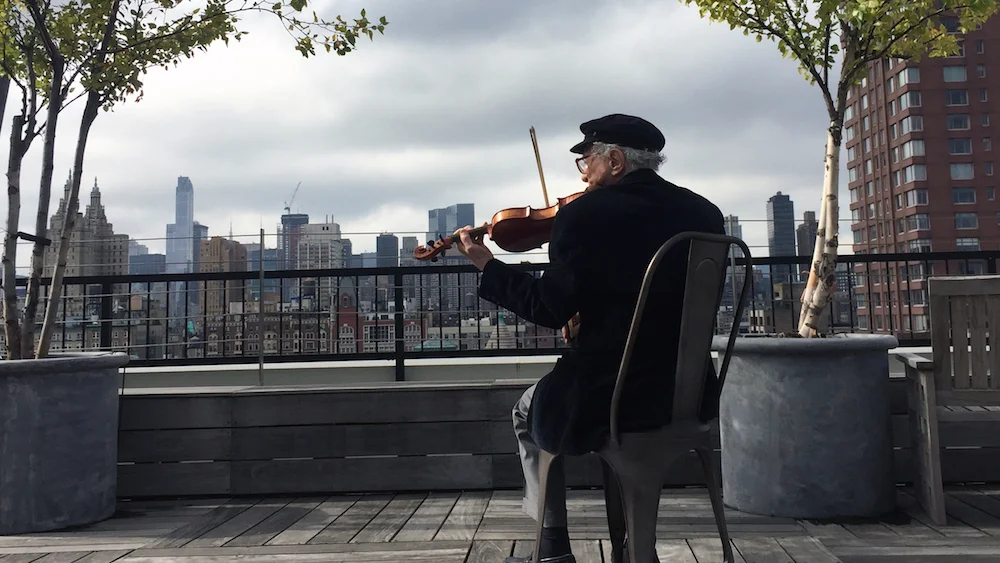Fiddler: A Miracle of Miracles Documents Enduring Appeal of Fiddler on the Roof
By Liam Lacey
Rating: B+
You Don’t Have To Be Jewish was the title of a bestselling mid-sixties comedy album, which is very much the spirit of the documentary Fiddler: A Miracle of Miracles. The film is a tribute to the 1964 musical Fiddler on The Roof, often rated up there with My Fair Lady, Oklahoma, West Side Story and Gypsy among the first rank of Broadway musicals.
The story of Tevye the dairyman — living in a shetl in Imperial Russia in 1905 with his wife and five marriageable daughters — would, at first glance, seem to have a specialized appeal. Adapted from the writings of Yiddish author Sholem Aleichem, the colourful folk tale was given a insanely hummable score by Jerry Book, along with lyrics by Sheldon Hamick and book by Joseph Stein. It became a hit, running for more than 3,000 nights before being adapted for film and restaged in numerous revivals. Why is it so popular?
According to director Max Lewkowicz’s lively and well-researched documentary, the keys were the story’s emphasis on tradition as a source of both strength and conflict, and the “universality” of Fiddler’s themes. We’re told by a long parade of interview subjects about the musical’s relevance to modern feminism (those rebellious daughters), the generational divide, and the plight of refugees. In the film, we see clips of Thai and African-American singers performing the musical. Hamilton creator Lin Manuel-Miranda even weighs in to say that the song “If I Were a Rich Man” is the most “universal” song in the entire Broadway canon. (I might go with Irving Berlin’s “There’s No Business Like Show Business” from Annie Get Your Gun).
A Miracle of Miracles is also a solid backstage story about the intense collective creative effort involved in creating one famous show. We have interviews with composer Harnick, along with late lyricist Jerry Bock and scriptwriter Joseph Stein (both who died in 2010) along with producer Harold Prince and early fan Stephen Sondheim.
There are also numerous cast members from different productions, including Austin Pendleton and Joanna Merlin, as the original young lovers, Motel and Tzeitel. Harvey Fierstein and Josh Mostel, both of whom have played Tevye onstage, offer their insights into the appeal of the man, who carried on an argument with God.
We hear a lot about the difficult genius, choreographer Jerome Robbins, who was initially reluctant to deal with the material but after a visit to the destroyed home of his Eastern Europe grandparents, decided to take it on. Robbins did extensive conceptual planning for the show, around themes of tradition and the image of the circle, deriving inspiration from visiting Hassidic weddings. Boris Aronson’s sets also borrowed from Marc Chagall whose painting, The Green Fiddler, was used for the title, the fiddler on a roof.
Though it was set in the past, Fiddler wasn’t free of contemporary political tensions. Zero Mostel, who played the first Tevye, disliked Jerome Robbins, who had testified to the House Un-American Activities Committee. (Fran Lebowitz says Robbins capitulated, fearing he would be outed as gay.) Author Alisa Solomon, author of a book about the musical, talks about how the image of Jews changed in the sixties, in part because of the 1967 war. Canadian director Norman Jewison, who directed the 1971 movie adaptation of the musical, insisted on casting a modern Tevye (Israel-born Chaim Topol) which signaled this shift in the perception of Jewish identity.
If there’s a weakness in the film, it’s that the “universal” praise begins to sound redundant and you long for more specifics, especially the musical’s significance in the history of post-War Jewish-American assimilation and changing cultural mores, especially around intermarriage. I recommend Elaine Showalter’s July essay in The New York Review of Books, (“Fiddler, Tevye’s Daughters and Me”) about Tevye’s rejection of his daughter Chava, who married a gentile. A great deal has changed since Fiddler’s debut in 1964, a time almost as far away from us now as Tevye and his shetl were from those first Broadway audiences.
Fiddler: Miracle of Miracles. Directed by Max Lewkowicz. Written by Max Lewkowicz and Valerie Thomas. Opens August 25 at Toronto’s Hot Docs Ted Rogers Cinema.

